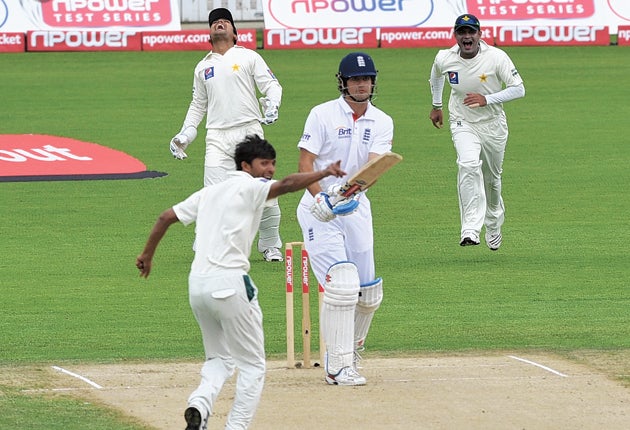Cook has one innings to save his place, but he is not England's only problem

Your support helps us to tell the story
From reproductive rights to climate change to Big Tech, The Independent is on the ground when the story is developing. Whether it's investigating the financials of Elon Musk's pro-Trump PAC or producing our latest documentary, 'The A Word', which shines a light on the American women fighting for reproductive rights, we know how important it is to parse out the facts from the messaging.
At such a critical moment in US history, we need reporters on the ground. Your donation allows us to keep sending journalists to speak to both sides of the story.
The Independent is trusted by Americans across the entire political spectrum. And unlike many other quality news outlets, we choose not to lock Americans out of our reporting and analysis with paywalls. We believe quality journalism should be available to everyone, paid for by those who can afford it.
Your support makes all the difference.As he sat in the pavilion yesterday, with many hours to kill before his next ordeal at the crease, Alastair Cook may have looked enviously at the carefree demeanour of Wahab Riaz. The two are both 25 years of age, but while Wahab is a debutant Cook is a veteran of 54 Tests.
It was, however, the Pakistani who looked at home in the Test arena. By mid-afternoon, when his figures were four for 16 off 8.4 testing overs, he must have been thinking what an easy lark this Test cricket was.
Cook knows the feeling, even if it is becoming an increasingly distant memory. Like Wahab he was thrust onto the elite stage, making an unexpected Test bow after being flown from the Caribbean to India as an emergency replacement for Marcus Trescothick. Cook responded with a century and subsequently became the youngest English batsman to reach the landmarks of 1,000, 2,000 and 3,000 Test runs. Before he was 23 he had seven Test centuries under his belt. A glorious career lay ahead of him.
The runs are harder to come by now. This summer he has made 106 in eight innings against Bangladesh and Pakistan, never reaching 30. Opponents know all about his preference for the leg-side and deny him opportunity to play there, instead seeking to explore his awareness of when to play, and when to leave, outside his off stump. As the runs have dried up so has his confidence, his uncertainty manifesting itself at the crease where he sways back and forward as the bowler approaches, worrying about his grip and backlift.
Yesterday, after his captain had opted to bat, Cook spent the first over at the non-striker's end where he soon realised that while the pitch looked good the overhanging cloud meant batting against the new ball would be testing. Then it was his turn. He left Mohammed Asif's first ball, then played the second back down the pitch. So far, so good. Then he was squared up and the ball shot off the edge of his bat between the slips and gully for four. The next ball beat the bat but struck him on the pad, the fifth was a no-ball. The next ball was turned, with an angled bat, to leg for two but Asif's sixth legal one brought him reaching forward to feather a thin edge to Kamran Akmal. Cook turned and made the long walk back, a day of introspective thought ahead of him.
Cook is now widely regarded as having only the second innings here to rescue his place, or be omitted from the next Test at Lord's. The word commonly used, however, is "rested", not "dropped", because everyone agrees his class is permanent, only the loss of form is temporary. Certainly Geoff Miller, the chairman of selectors, gave him forthright backing prior to this match. "We know what he is like as a character – he is a battler and will battle his way through it," Miller said.
It would be less of a problem for England if Cook were the only one struggling. But Kevin Pietersen and Andrew Strauss are also short of runs. Pietersen may be widely regarded as the best batsman in the team – not least by himself – but his last century was in March last year, on a featherbed in Trinidad. That is his only ton since losing the captaincy. Strauss, his successor, has not scored a century since the Lord's Test last year against Australia, more than 20 innings ago.
As a result England's top order looks worryingly fragile. Rare is the team which wins a Test series in Australia without a strong opening partnership to blunt the Kookaburra ball. Yet England have only reached 50 once this summer without losing a wicket, and in South Africa last winter Strauss and Cook averaged 30 as an opening partnership.
It is not, however, as if there is a platoon of putative replacements staking out their claim by thrashing county attacks across the shires. With the Kent pair of Joe Denly and Rob Key having regressed, and Andrew Gale yet to deliver on his promise, Hampshire's Michael Carberry is the leading contender, with Yorkshire's Adam Lyth a longer shot.
The generally suggested solution is to promote Jonathan Trott to open in Australia, enabling Ian Bell, currently injured, to return. However, that may mean moving an unwilling Pietersen to No 3.
Trott should also be given some experience at opening. That can only be done by dropping Cook for Lord's, and bringing in his county team-mate Ravi Bopara. If Bopara then makes runs – as well he might – Cook could spend a winter watching the Ashes from afar. There is, indeed, much at stake when he next comes to the crease.
Join our commenting forum
Join thought-provoking conversations, follow other Independent readers and see their replies
Comments